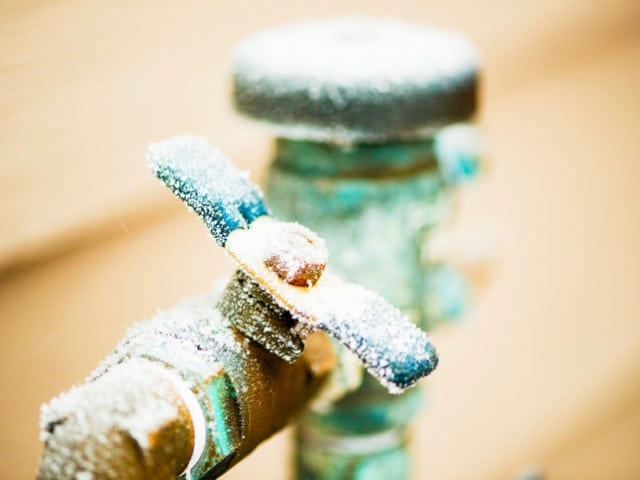Protecting your pipes during the winter is important because freezing temperatures can cause pipes to burst, leading to significant damage and costly repairs. When water freezes, it expands, which can cause pipes to crack or break. It can lead to leaks or flooding in your home and costly repairs to fix the damage. Prevent Pipes From Freezing by following these professional tips from Underwood Plumbing & Septic.
Even if the pipes do not burst, frozen pipes can restrict the flow of water, which can cause low water pressure or no water at all. By protecting your pipes during the winter, you can prevent costly damage and ensure that your home has a reliable water supply. Below, we look at six tips to prevent pipes from freezing during winter.
1. Keep the Thermostat Set to the Same Temperature
Keeping your thermostat set to the same temperature during the winter can help prevent your pipes from freezing. When you lower the temperature in your home at night, or when you are away, it can also cause the temperature near your pipes to drop as well.
Keeping your thermostat set to a consistent temperature ensures that the area around your pipes stays warm enough to prevent freezing. It is recommended to keep the temperature above 55°F. This will ensure that the heat in your home is distributed evenly and that your pipes are less likely to freeze.
If you’re going away on vacation, you should consider leaving your thermostat set to a temperature above 55°F or even consider getting a smart thermostat that can be controlled remotely, so you can ensure your pipes are safe even when you’re away.
2. Insulate Pipes in Unheated Areas
Insulating pipes in unheated areas, such as the garage or attic, can help prevent them from freezing during the winter. When pipes are located in areas of your home that are not heated, they are more susceptible to freezing temperatures. Insulating these pipes can help keep them warm, preventing freezing.
There are several types of insulation materials that can be used to insulate pipes, such as
- Foam pipe insulation
- Fiberglass pipe insulation
- Electrical heating tape
Foam pipe insulation can be cut to fit the size of your pipes and then slipped over them. Fiberglass pipe insulation can be wrapped around the pipes and held in place with wire or duct tape. Electrical heating tape can also be wrapped around pipes and plugged into an electrical outlet to provide added warmth.
Insulating pipes in unheated areas can save energy and money on heating costs, and it’s especially important during the winter months to protect pipes from freezing and bursting.
3. Disconnect Garden Hoses
Disconnecting garden hoses during the winter is important because water left in the hose can freeze and expand, causing the hose to rupture or crack. It can lead to water damage in the home and potentially cause the pipes connected to the hose to freeze and burst.
It’s also recommended to drain any outdoor faucets and pipes to prevent freezing. It’s a good idea to store the hoses in a protected area during the winter to keep them in good condition for the next season.
4. Open Cabinet Doors Where Plumbing Exists
Opening cabinet doors to protect plumbing during the winter prevents pipes from freezing. Pipes that run through cabinets or vanities, especially those located on exterior walls, can be vulnerable to freezing temperatures.
Opening the cabinet doors allows warm air from the home to circulate around the pipes and keep them from freezing. It’s also a good idea to leave the faucet dripping overnight when temperatures are expected to be below freezing to help prevent freezing.
5. Seal Cracks or Openings in Walls and Floors
Sealing cracks and openings in walls and floors can help protect pipes from freezing by preventing cold air from entering the space around the pipes. It can be done by using a variety of materials, such as
- Caulk
- Expanding foam
- Weatherstripping.
Insulating the pipes themselves can also help to keep them from freezing. It’s important to make sure that the seals are tight and that any insulation is installed correctly to ensure maximum effectiveness.
6. Allow the Faucet to Drip During Winter
Allowing a faucet to drip during the winter can help prevent pipes from freezing. When a faucet is left open, even just a small drip, it allows water to flow continuously through the pipes. This movement can help to prevent the water in the pipes from freezing, even in extremely cold temperatures.
The constant flow of water can help to release any built-up pressure in the pipes, which can cause them to burst if the water inside freezes and expands. It’s important to note that this technique is most effective when used in conjunction with other measures, such as proper insulation, to help keep the pipes from freezing.
Keep Pipes From Freezing with Professional Plumbing Maintenance from Underwood
When was the last time you scheduled an inspection on your plumbing system? Now is the time to get professional maintenance on your system to keep your pipes from bursting this winter. Underwood Plumbing & Septic offers complete plumbing services in Bonham, Texas.
Fill out our online contact form or call us to schedule plumbing services this winter.
To get more daily updates don’t forget to follow Underwood Plumbing & Septic on Instagram and Facebook.

